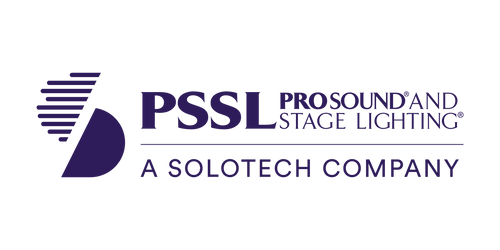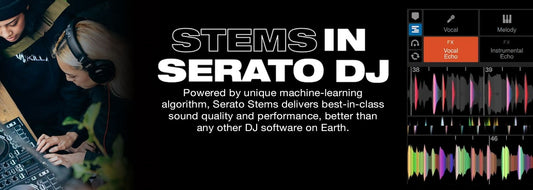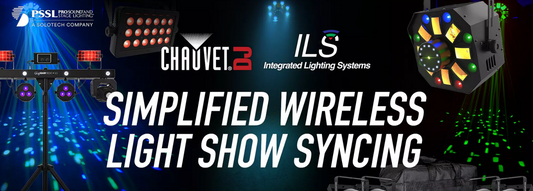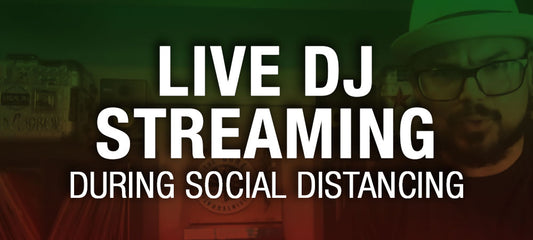Richard Blade - Legendary SiriusXM, KROQ and Mobile DJ
If you grew up on the West Coast during the 80's, we're sure you've heard of Richard Blade. He's best known from his nearly two decades as a disc jockey for the "World Famous KROQ" radio station in Los Angeles. Richard was one of the instrumental DJs that turned KROQ into the ultimate New Wave station during that time period and pushing the genre into the lime light. These days you can find him on SiruisXM on channel 33's "First Wave", playing classic alternative like Depeche Mode, Duran Duran and more. We sat down with Richard at Swing House Recording Studio in Hollywood California to discuss his career achievements and get his take on the evolution of the DJ and Radio industry.
You can catch Richard's SiriusXM Satalite Radio Show on First Wave Ch. 33 Monday-Friday Noon to 6pm Pacific Standard Time. You can contact Richard on facebook at facebook.com/RichardBladePage or on Twitter at @RichardBlade
Tell us a little about your history and how you got started.
I'm quite well known on the west coast for working for KROQ. I also worked at KNAC in Long Beach before that. I worked in Bakersfield and San Luis Obispo and prior to that, I was a mobile DJ in LA. Knocking on the doors, trying to get into radio and doing a lot of private parties. I was fortunate to work with Michael Jackson a bunch of times, Barbara Streisand and Larry Hagman. The beginnings of my career are in Europe. I DJ'd in Oxford, which is where I went to college, and all the university colleges there. When I left, I went to Europe and toured Europe for two years and played all over Europe in the clubs but I always wanted to come to America. Cause the sunshine, blue skies, California girls – that's the dream of any red-blooded Englishman.
Over your expansive career, what has stood out as a highlight?
Most recently, the highlight has been that I have stepped out of any shyness I've had. I don't seem like a shy person but sometimes when you're working live, there are certain boundaries you don't want to step over. And people would expect certain things of me before I became a name on the radio. They wanted me to be a little more dignified. Recently, I think in the last year, I've become the best mobile DJ I can be. Which after 30 years of doing it, it's a huge step forward cause I always thought I was a pretty good mobile DJ and I didn't think I would get any better. So a highlight for me as a mobile DJ is that self-reinvention that I've been able to improve and step my game up so now I'm thinking I can do even more and more.
What equipment do you currently use professionally?
I have a new baby! I've used the DDJ-SX quite a few times over the last couple of months. A good buddy of mine has one and it is the sexiest beast I've ever seen! He actually does video mixing and has used it with the Serato Video program. I do carry backup for everything. I usually bring a little Hercules 4MX, it fits in my hard-shell backpack with my laptop stand, laptop, a whole bunch of wires, my mic and my headphones. I use Pioneer headphones - they're great. Then I have a little backup computer in case my other computer goes down. QSC's are great speakers. I often use the K-8s with a little sub, or if it's a bigger gig, I use the K-12s with a sub.
What's the one piece of gear that you've always held onto?
I used to build all my own gear. I used to actually build it with a jigsaw, particle board, glue, carpet to make the consoles. I wish I had held onto it all but I didn't. The one thing I did hang on to was my box of singles. I actually built the box myself with my name on it, which was DJ Dick Sheppard at the time. I still have the singles. If I went into it, there would be Little River Band in there and Doobie Brothers and Barry White and all that kind of stuff. But I had to hold on to that box because I remember being in Norway, lugging that box around.

The 80s genre is a significant influence in today’s alternative and pop music. Why do you think this is?
It's funny because I'm known so much for the 80's, even though I have a personal history of disco – which I still love – and club music right through to today. But I think the 80's today is almost more popular than it was back then. Back then, we were considered punk. I mean it's hard to believe that Devo "Whip It" was considered a punk song and that kids shouldn't listen to it. I think the 80s is so popular still to this day because it's fun music. A lot of it is up-tempo, great dance music. I call it the Shuffle Generation. For them, Pitbull, Lil Wayne and A-ha are all good artists. They don't think that Pitbull is today and A-ha is 25 years ago. It's just a good song. "Take on Me" to them is as relevant as a Lil Wayne song or Bruno Mars "Locked Out of Heaven".
You are the undisputed Master of the 80s Mix. Are there any current bands or musicians that you follow/listen to?
I'm known for the 80s but I love a lot of music. I'm up with all the current music – I have to because I do so many gigs. So when kids come up and ask for me to play Harlem Shake and stuff like that, I have to be able to play it. So I'm very much up with modern music. I listen a lot to DJs and producers like Tiesto. Skrillex is a little hard for me to be quite honest but Swedish House Mafia is fantastic. I'm sad they have broken up. And if I'm driving? People like John Digweed. I find it great because to me that's almost an ambient dance. And then the other music I love is Brazilian music. I think it's absolutely fantastic. I joked with my wife that at my wake in about 250 years time, I want Sergio Mendes and Mas Que Nada played.

How do you see the advance of digital media affecting the future of DJ technology?
One of the amazing things with DJ equipment is keeping up and actually forcing some of the change that's happening in the music world with the arrival of digital technology. Regular broadcast radio has lagged behind because they didn't adapt quickly enough to the internet, the iPod, satellite radio. But I think the DJ manufacturers need to be congratulated. I think the fact that you can carry something that is so unbelievably advanced in your hands is beyond belief. With the continuing change in equipment, I see the manufacturers leading in the way [with] a lot less wiring going on. Bluetooth and wireless technology is going to be consistently more and more stable. So there is going to be less wiring and fewer cables, which is great. By the way, if you're a DJ and you're running power cables, throw the orange ones away! Don't ever use orange cables at a gig. Please. It's so ghetto, it will bring you down. You can make more money with a black cable. It's worth it.
What’s your most embarrassing on-air moment?
What could have been my most embarrassing moment – but I kind of covered up – I was working at KNAC, doing the overnights – midnight to 6. It was long, particularly when you're doing gigs in clubs and mobiles and things like that. I was playing "Light My Fire" from the Doors, which if you have the vinyl of the Doors greatest hits, it's track number two. So I'm playing "Light My Fire", which is seven minutes long. I actually like this song and I had it cranked. Then I woke up and "Break on Through" was finishing – which is the last track on that side. It was about 3:30 in the morning so the boss wasn't listening and there was no recording so he wasn't going to find out. So I just let "Break On Through" finish and then I hit the mic on and I went, "It's so good to hear an entire album side sometimes. Here you go, The Doors." And then it's like BAM, I hope no one realized that I fell asleep.
During your career, what was that hardest time for you and how did you overcome that?
The hardest time for me in my career was when I first came to America. I had already done clubs in Europe and clubs in England. I wanted to break into American radio but it was just one door after another slammed in my face. So I started doing mobiles and the clubs to keep myself busy. I got incredibly successful with both. So things were good but it was radio that I had come over here for. I made a little home studio with an Akai tape deck. I'd edit it and every week I would send out new audition tapes to all the radio stations in town. It was a very, very tough time. It was constant rejection. I mean, everyone has gone through it, whether you want to write a book, write a screen play, become an actor or whatever. You just have to have that tough skin and believe in yourself and keep going. And finally I won a contest on KWST, which is now Power 106, as Best Unknown DJ from a cassette I had sent in. I got an hour on the air with JJ Jackson. I took that one hour I did on the air at KWEST and edited that down and I sent it out to a bunch of stations in California. The next day I got hired in Bakersfield as the Music Director of a hard rock station called Magic 98.

How do you feel about the explosion of social media and how does it affect your industry and career compared to before?
One thing about digital media, it's not just the music but the way we communicate has changed. Facebook and Twitter have become huge. Now I get, obviously, a huge audience from the radio. I've been fortunate to have quite a few people in certain areas of the country know who I am. But with Facebook, I find that I put my posts up there, I'll put pictures of my gear up there and talk about the gigs and I get so much work through Facebook. People contacting me through Facebook, asking if I can DJ a party for them or what time do I go on at House of Blues when I'm opening for a band. One thing I find very important is when people message me on Facebook, is to try and reply to them because at a lot of my gigs, people come up and say, "Hey, I wrote you a letter at KROQ and you actually wrote back to me!" They remember that 30 years later and I try to carry that with me. When I write back, they get a real kick out of it and I'm thrilled by that! Social media is huge for every DJ out there. Start using it. I'm probably preaching to the choir. I'm sure DJs are already using it. But it is massive and only getting bigger and bigger.
Coming from the days of playing vinyl, how hard was it to transition to digital?
With the transition from vinyl to digital, there's a lot of DJs that I know that love their vinyl and are vinyl snobs. I was thrilled to leave vinyl and go to CD. And then thrilled to go from CD to digital because it’s so much easier. I've always been into the gear, always believed that as a DJ I have to know my stuff. I have to know how to change one of these channels if it goes down myself. If I'm at a gig and something goes wrong, I'm going to fix it. So for me transitioning to digital from vinyl was not only easy and welcomed, it was a blessing. And quite often, in those slow points of the night, I will have a conversation with myself. I will talk to myself in the late 1970s and try and explain what this gear is. And what a computer is and what digital is. And Richard back then looks at Richard now with such envy that he doesn't have to lug all of this incredibly huge, cumbersome gear around.
If you could create a new DJ and/or Recording product, what would it be?
It would be a clone of me because, unfortunately, I can only do one gig. I can't create a Richard Blade DJ company and send out someone else to DJ. When someone books me, it has to be me there. I never cancel a gig and I don't cut a gig short to do two gigs in a night. The people that come up with these products have such an imagination and they're thinking of stuff that I haven't even thought about. So I just look forward to the next advance in technology. I'm excited about Bluetooth and the interaction with technology like iPads and Androids. So whichever way it goes, I'll leave it to the engineers and the creative people.

What advice do you have for people just starting out in the world of DJing?
If you're just starting out in DJing today, it's a different world. It really is. Don't go necessarily for broadcast radio. Broadcast radio is, I think, unfortunately on it's last legs because of satellite, because of Pandora and Spotify and things like that. Broadcast radio is not the place to be. Try producing your own music if you can. But for 99% of all the DJs, there's a lot of work out there as a mobile DJ and as a club DJ. And the #1 most important thing as a live DJ, far more important than anything else, is read the crowd. It doesn't matter how good you are at mixing. It doesn't matter about loops and drops and phasers and effects and sirens. None of that matters. If you don't read the crowd, you are a crap DJ because you will lose the audience. Play the right music for the crowd and give them a great night, you'll be invited back. If you can read the crowd and do the mixers and do the loops and do the effects and produce your own music? Fantastic. Then you are ahead of the whole game. But they are the audience, they're the ones that make sure you get another gig. So give them a good time. And no orange power cords!

You've been a friend and client of PSSL for many years. Why do you choose to shop with us?
Personally, as a DJ, both on the radio and working live, I'm always in clubs, always doing mobiles. I do at least two or three mobiles every single week with my own gear. It's important for me to find a place where I can buy gear at a good price and from people who know what they're doing. And so many stores I've been into, they're too busy specializing in other things. But I found at PSSL, you walk in there and everyone knows what they're talking about. And it's the same when I call on the phone. I've got nothing but good things to say over the years with my experience at PSSL. I've never had to call up and say, Dude, you know, this was wrong or why hasn't it arrived. It comes on time. It comes at the right price. And everything works.




